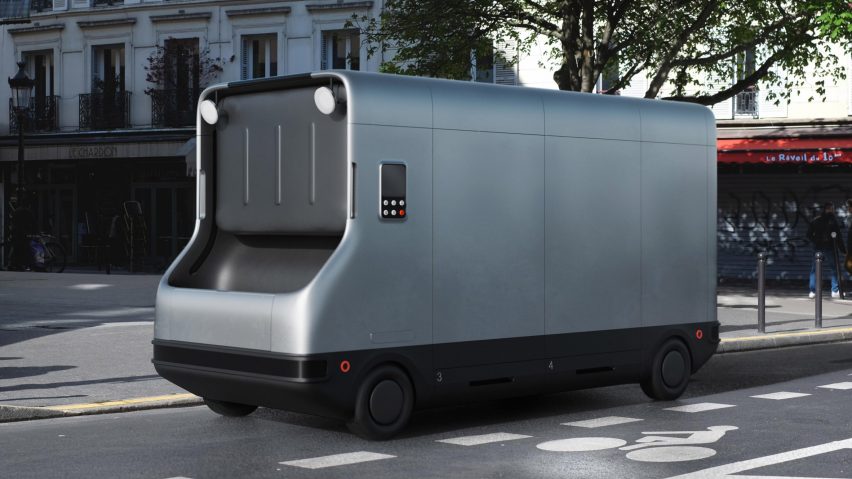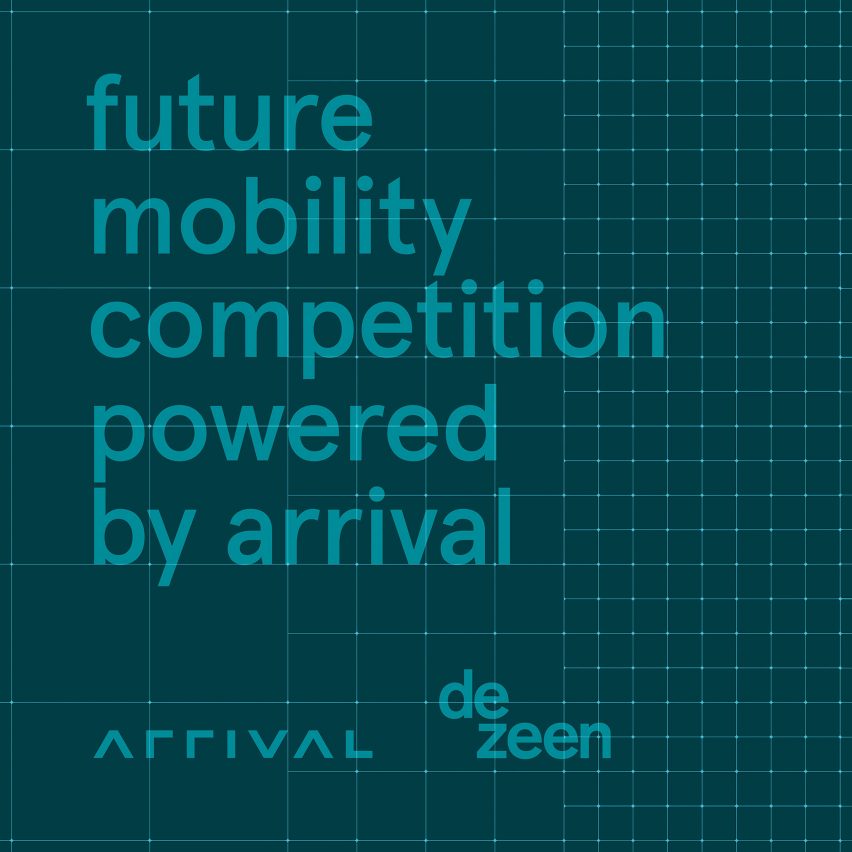
Unknown Untitled's vision to overhaul refuse-management vehicles in Paris takes second place in the Future Mobility Competition
Unknown Untitled's proposal to create a family of electric autonomous refuse trucks with compact footprints for the narrow streets of Paris has been awarded second place in Dezeen's Future Mobility Competition powered by Arrival.
The studio designed a series of refuse vehicles to collect general waste, items for recycling such as glass, cardboard, plastic and bio waste, as well as furniture in a bid to reduce congestion in Paris and improve waste management across the city.
The concept was developed to tackle the bottleneck of traffic caused by bulky refuse trucks dominating the narrow streets of the city during commuting hours, which currently prevents even smaller vehicles, pedestrians or cyclists from passing through easily.
Called Refuse Management Vehicle Fleet, each model shares a common modular chassis and features a slim footprint to take up less space on the street.
The vehicles are electric and autonomous, meaning they are able to dispatch themselves and identify when bins are full and need to be emptied. The removal of the driver's cockpit enables more of the truck's space to be used for waste collection.
"It's a perfect example of a service that can be automated"
The vehicles are designed to carry out waste collection and travel to recycling centres throughout the night to alleviate traffic congestion and noise pollution during peak rush hours.
The Future Mobility Competition judges, which included Kunlé Adeyemi, Elizabeth Diller, Yves Béhar along with Jeremy Offer and Martina Wierzbicki from Arrival and Marcus Fairs and Cajsa Carlson from Dezeen, selected the entry as the runner-up in the competition, which called for mobility solutions that reimagine the future of transportation.
"The concept addresses a citywide problem, but it's a mass-market product," said the judges.
"It's a perfect example of a service that can be automated. It's about time refuse trucks got redesigned."
Read more about the proposal below:
Refuse Management Vehicle Fleet
Unknown Untitled
Paris, France
Second place
"Although waste management has changed and should continue to evolve in the coming decade, refuse trucks and garbage collection have not changed for quite a long time.
"Paris offers a network of narrow mediaeval streets drawn toward large avenues. The city is dense and heavy traffic is inevitable especially from 7-10am and from 5-8pm.
"Refuse trucks are often accountable for traffic jams. They are too wide to be passed, even by micro mobility commuters and are a terrible nuisance for pedestrians, bike riders and residents, stopping every ten yards.
"In Paris 2030 the number of private cars would be drastically reduced. The street parking would become a great piece of real estate to accommodate recycling equipment. That is why the skateboard platform is designed to fit a typical parisian parking slot width.
"The first unit of the fleet is a self-driving refuse truck, aiming to solve short-term issues such as pollution, traffic jams and noise nuisance.
"The other vehicles include a waste truck for recyclable materials, which is taller than the others, as paper packaging and cardboard are much lighter than regular trash.
"Another is a glass deposit truck, collecting empty bottles of any types, which would be resold to progressive food and beverages companies.
"There is a large item collection truck to move away large pieces of furniture, mattress, appliances, which would be treated in recycling centres.
"Due to the modular aspect of the concept, we could imagine many more, each of them suiting the needs of specific communities in diverse areas of the world."

Future Mobility Competition
The Future Mobility Competition is a global design contest that seeks to support emerging talent, bringing radical solutions to solve mobility challenges in cities and, in turn, create true sustainability and empower local communities.
Launched in partnership with electric vehicle company Arrival, the contest asked entrants to identify problems with mobility in their city, or a city they are familiar with, and propose solutions that will improve how people move around their environment.
The contest received over 170 entries from more than 45 different countries around the world.
The panel selected 10 proposals as finalists to be published on Dezeen. We are unveiling one finalist a day from 27 June, culminating in the winner being announced on 8 July.
The winner will win the top prize of $25,000, while the runner-up will receive $15,000 and the third-placed entrant will receive $10,000. Each of the seven remaining finalists will receive prize money of $5,000.
Find out more about the Future Mobility Competition ›
See all the finalists revealed so far ›
Partnership content
The Future Mobility Competition powered by Arrival is a partnership between Dezeen and Arrival. Find out more about Dezeen partnership content here.